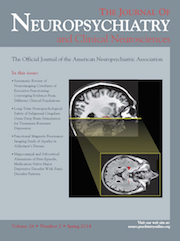To the Editor: Depression affects approximately 50% of people with Parkinson’s disease (PD)
1 and is a significant risk factor for cognitive impairment in this medical condition.
2 Yet, little is known about the extent to which cognitive skills in PD improve following successful depression treatment. We recently conducted an National Institutes of Health (NIH)-sponsored randomized-controlled trial (RCT) of face-to-face Cognitive-Behavioral Therapy (CBT) plus clinical monitoring, versus clinical monitoring only, for depression in Parkinson’s disease (dPD).
3 In this RCT, we demonstrated that improvements in mood were associated with modest gains in verbal memory and executive functioning following the psychosocial treatment of dPD.
4 We also found that baseline working memory and executive skills were related to depression improvement over time.
4 This letter is the first to describe the impact of telephone-based CBT for depression on neuropsychological functioning in PD.
Methods and Results
Twenty-one people with PD and their caregivers participated in an uncontrolled pilot investigation of telephone-administered CBT.
5 The sample was predominantly female (62%), Caucasian (95% Non-Hispanic White), and highly educated (81% with college degree or higher). On average, people with PD were 65.86 (9.32) years old and carried a confirmed PD diagnosis for 7.45 (5.17) years. The majority of the sample had Major Depressive Disorder (95%, N=20), whereas 24% (N=5) had a secondary anxiety disorder diagnosis.
The study had full approval of the Robert Wood Johnson Medical School institutional review board. Written informed consent was obtained prior to the initiation of any study procedures. CBT was administered by telephone for 10 weeks and included behavioral activation, cognitive restructuring, sleep hygiene, anxiety management, and caregiver psychoeducation. The content and duration of the CBT intervention was identical to that employed in our face-to-face RCT. Neuropsychological testing was conducted pre (baseline) and post-treatment (week 10). Treatment fidelity was high. Ninety percent of participants completed the trial.
Data were analyzed with SPSS Version 18. An intent-to-treat approach was employed in all statistical analyses. Linear Mixed Models Analyses indicated that telephone-administered CBT was associated with improvements in verbal memory [immediate recall as assessed by the Hopkins Verbal Learning Test-Revised (HVLT-R)] over the course of the trial [F (1,18) = 7.38, p=0.01; Cohen’s d=0.82] (primary outcome). Phone-based CBT was not associated with any additional cognitive gains [i.e., delayed recall and recognition (HVLT-R), working memory (Digit Span, Letter-Number Sequencing), executive skills (Delis-Kaplan Verbal Fluency Test)]. Discriminant Function Analysis indicated that baseline verbal and working memory predicted improvements in depression following 10 weeks of phone-based CBT (X2 = 14.45, df = 4, p=0.006). Pooled within-group correlations between discriminating variables and standardized canonical discriminant functions were as follows: Recognition (0.901), Recall (0.635), Letter-Number Sequencing (0.519), and Digit Span (0.296).
Overall, results of this study, viewed in the context of neuropsychological findings from our previous face-to-face CBT trial,
4 suggest that intact working memory may be a prerequisite to the derivation of optimal benefit from CBT, while verbal memory may be particularly important for telephone-based treatment approaches in PD. Traditional methods of psychotherapy delivery (i.e., face-to-face) may be warranted for PD patients with more extensive cognitive limitations. Further research is needed to inform optimal methods of mental health treatment delivery in PD for those with varying degrees of cognitive impairment.

